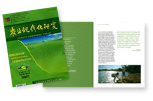- You are here: Home > Research > Research Progress
Southwest China is an ecologically fragile area, where rocky desertification has been identified as the most severe ecological problem threatening ecosystem services. To protect and improve the ecological environment, the state and local Chinese governments have launched a series of ecological restoration projects (ERPs), such as the Karst Rocky Desertification Comprehensive Control and Restoration Project. Quantifying the effectiveness of these projects on vegetation is important for guiding the implementation of the subsequent projects in karst regions.
Researchers from the Institute of Subtropical Agriculture, Chinese Academy of Sciences (ISA) and University of Copenhagen combined long-term satellite and statistical data to evaluate the efforts of ERPs on vegetation dynamics across Southwest China in recent decades. Moreover, the project effectiveness (i.e. the relation of invested money and observed efforts) was assessed.
They found a high effectiveness in the Guangxi Province, a moderate effectiveness in the Guizhou Province, and low or no effectiveness in the Yunnan Province. "The ERPs implemented in the Guangxi Province had a larger positive effect on vegetation dynamics than in other the provinces. Human activities in the Yunnan Province had a larger negative effect on vegetation than in the Guangxi Province." said TONG Xiaowei, a doctoral researcher at ISA.
The scholars also found that the successful implementations were not only related to the project intensity but also to the combined influence from natural conditions (climate and terrain) and human management (such as the species selection and compensation rate for peasants).
Besides, the study found counties with high project effectiveness in spite of complex natural conditions, but also counties with negative vegetation trends despite relatively favorable conditions and high investments.
This work was supported by the National Key Research and Development Program of China (Grant No. 2016YFC0502400), Science and Technology Service Network Initiative (No. KFJ-EW-STS-092), Chinese Academy of Sciences "The Dawn of West China" Talent Training Program, National Natural Science Foundation of China (Grant No. 41471445, 41371418), and European Union's Horizon 2020 research and innovation program under the Marie Sklodowska-Curie (Grant No.656564).
The study entitled "Quantifying the effectiveness of ecological restoration projects on long-term vegetation dynamics in the karst regions of Southwest China" has been published in the February issue of International Journal of Applied Earth Observation and Geoinformation, details could be found at http://www.sciencedirect.com/science/article/pii/S0303243416301702
Contact: WANG Kelin
E-mail: kelin@isa.ac.cn
Institute of Subtropical Agriculture, Chinese Academy of Sciences
Address: Mapoling of Changsha City, Hunan province, P.R.China.Tel: +86-731-4615204 Fax: +86-731-4612685

